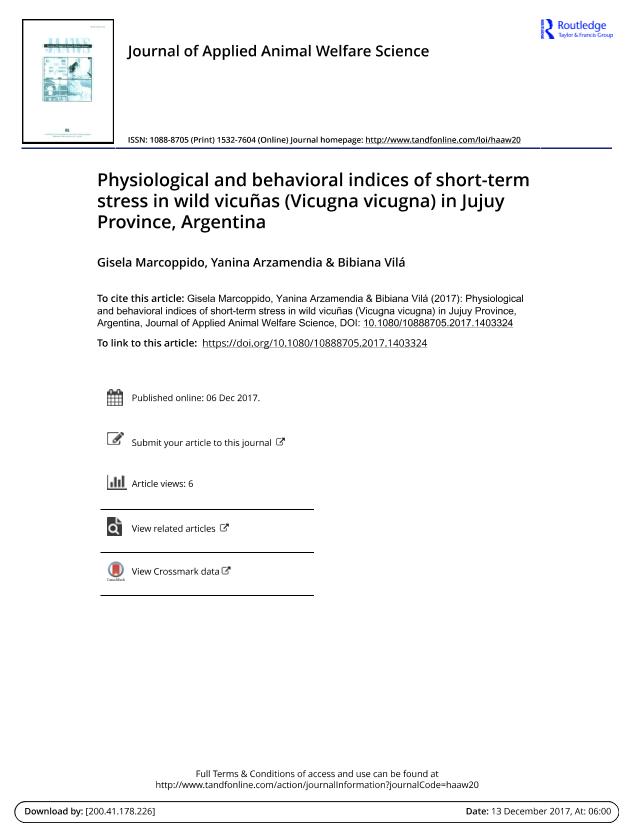Artículo
Physiological and behavioral indices of short-term stress in wild vicuñas (Vicugna vicugna) in Jujuy Province, Argentina
Fecha de publicación:
07/2018
Editorial:
Routledge Journals, Taylor & Francis Ltd
Revista:
Journal Of Applied Animal Welfare Science
ISSN:
1088-8705
Idioma:
Inglés
Tipo de recurso:
Artículo publicado
Clasificación temática:
Resumen
The management of wild vicuñas can trigger a stress response that may compromise welfare. In Santa Catalina, Jujuy Province, Argentina, indices of short-term stress associated with capture, handling, and shearing were studied in 105 wild vicuñas (Vicugna vicugna). The study included 2 groups (n = 59 and n = 46) of wild vicuñas captured in 2 consecutive days. Independent variables analyzed included sex, restraint time, and groups. Cortisol, creatine kinase, glucose, white blood cells, temperature, heart rate, and respiratory frequency were higher than published values. Respiratory rate increased during handling and correlated with holding time and group size, while heart rate decreased. Packed cell volume was higher in females. Cortisol concentrations differed between restraint groups and sex and inversely correlated with agonistic behavior. The most common behavior was increased vigilance. Sternal recumbency increased over holding time. During handling procedures, frequency of sudden movements like kicking and attempts to stand increased as restraint time increased. Females vocalized more than males. In conclusion, the methods used triggered measurable changes suggestive of short-term stress that appeared to be physiologically tolerated by the vicuñas.
Palabras clave:
Argentinean Puna
,
Capture
,
Stress
,
Wild VicuÑAs
Archivos asociados
Licencia
Identificadores
Colecciones
Articulos(SEDE CENTRAL)
Articulos de SEDE CENTRAL
Articulos de SEDE CENTRAL
Citación
Marcoppido, Gisela Ariana; Arzamendia, Yanina; Vila, Bibiana Leonor; Physiological and behavioral indices of short-term stress in wild vicuñas (Vicugna vicugna) in Jujuy Province, Argentina; Routledge Journals, Taylor & Francis Ltd; Journal Of Applied Animal Welfare Science; 21; 3; 7-2018; 244-255
Compartir
Altmétricas




